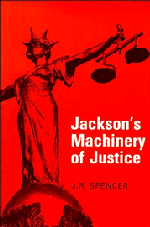Book contents
- Frontmatter
- Contents
- Acknowledgements
- List of figures
- List of tables
- Preface
- Preface to the first edition of ‘The Machinery of Justice in England’
- Abbreviations
- I Historical introduction
- II Civil jurisdiction
- III Tribunals
- IV Criminal jurisdiction
- V The personnel of the law
- VI The European dimension
- VII The cost of the law
- VIII Law Reform
- Appendix A The Report of the Civil Justice Review
- Table of Cases cited
- Table of Statutes cited
- Table of Stationery Office publications cited
- Index
Appendix A - The Report of the Civil Justice Review
Published online by Cambridge University Press: 10 January 2011
- Frontmatter
- Contents
- Acknowledgements
- List of figures
- List of tables
- Preface
- Preface to the first edition of ‘The Machinery of Justice in England’
- Abbreviations
- I Historical introduction
- II Civil jurisdiction
- III Tribunals
- IV Criminal jurisdiction
- V The personnel of the law
- VI The European dimension
- VII The cost of the law
- VIII Law Reform
- Appendix A The Report of the Civil Justice Review
- Table of Cases cited
- Table of Statutes cited
- Table of Stationery Office publications cited
- Index
Summary
The Civil Justice Review (see pages 83–85 above) produced its 181-page Final Report in June 1988. In paragraph 48 the main problems of civil justice are said to involve ‘delay, cost, complexity and access to justice’.
As a major source of cost and delay in civil justice the Review identifies the inefficient distribution of business between the High Court and the county court. As explained in chapter 6 of this book, a large amount of the business of the High Court consists of cases which fall within the limits for county court jurisdiction, and which need not have been brought in the High Court at all. It is partly because of this type of work that the High Court is continually overloaded, and hence subject to delay. Delay is bad, not only in itself, but because it invariably means an increase in costs. By comparison with the High Court the county courts are not heavily overloaded. Hence the Civil Justice Review thinks the sensible solution to much of the problem of cost and delay is to send to the county court much of the work which at present is handled by the High Court. As things stand it is theoretically possible for the High Court to transfer work to the county courts – but in practice it does not do so very often.
- Type
- Chapter
- Information
- Jackson's Machinery of Justice , pp. 511 - 519Publisher: Cambridge University PressPrint publication year: 1989

